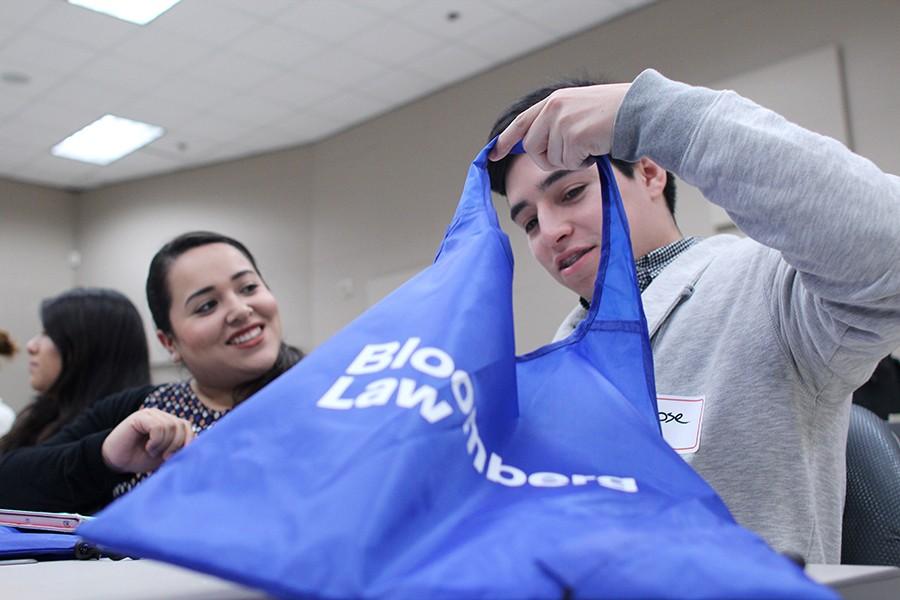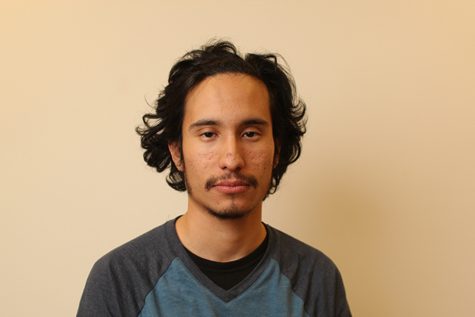Diversity Outreach Day boosts inclusion
Graduate school event serves as resource for minorities, provides legal guidance
Christian Urrutia / The Advocate
COPA Club President Milca Baires (left) and COPA secretary Jose Arebalo pack up their things as they leave a mock class during the Diversity Outreach Day event at UC Hastings College of the Law on Saturday.
Apr 11, 2016
SAN FRANCISCO — When Community Organizing and Political Action (COPA) Club President Milca Baires saw the opportunity to visit UC Hastings College of the Law Saturday to change a male dominated profession catered toward whites — she didn’t hesitate.
“I believe that in politics, especially among the (legal) community, it is male dominated. But at this event I saw a lot of women and that was exciting.
“We need diversity in not just race but gender as well. Ninety-five percent of guests (here) were women, which was satisfying to see,” Baires said.
She and fellow Contra Costa College COPA secretary Jose Arebalo traveled to UC Hastings for Diversity Outreach Day, a program aimed at expanding opportunities to low-income minorities and historically underrepresented communities as they attempt to obtain a legal education.
Arebalo and Baires met with Berkeley City College anthropology major Madgalena Olvera as they traveled via BART to the graduate school early in the morning.
The student-run event featured breakfast, an overview of the day’s program, a keynote speech, a law school mock class, an admissions workshop, a Law School Admission Test (LSAT) class, an attorney/student panel and a personal statement review seminar meant to enlighten participants on how to enroll into law school.
This event was sponsored by the university’s La Raza Law Students Association and For People of Color, Inc., an educational consulting firm, to provide students insight of the reality of the profession and how to reach the next level of legal education “and made me understand the application process,” Arebalo said.
“The personal stories that these law students shared allowed me to see what I needed to prepare for (academically), which was something invaluable to learn,” he said. “The event in itself essentially promotes what we’re doing at community college and using it to move on to the next academic level and facing the reality behind it as we’re making that next step.”
Olvera said, “I attended (Diversity Outreach Day) to get that extra support and to see how to get your foot in the door and to be better informed.”
She said the most important thing she learned was how complicated the process is to apply for law school, particularly for minorities.
The keynote speaker, attorney Sunita Bali for the law firm Perkins Coie, said, “The numbers are dismal. There are not a lot of people who look like us in the profession. You can talk to any practicing attorney and no matter where they work I can tell you if they’re a person of color — they’re in the minority. This is still a heavily male-dominated profession. If you’re a woman and a person of color, you really, probably are going to be the only one.”
Bali also said that despite this massive disparity in gender and racial representation, it is the current reality of the situation and students must accept that.
“There is a lot of work to be done and I commend all of you for taking this step,” she said.
She said For People of Color, Inc. serves as a resource for students to help make it through this process and help demystify the process somewhat along the way.
Throughout the event, first- and second- year UC Hastings law students were on hand to answer questions. Some of students spoke on panels alongside working professionals during one session and others assisted in reviewing personal statements in a separate workshop.
Baires said, “I had the opportunity to sit in with law students and go over personal statements. They gave us helpful guidelines on what to do and what not to do. That session will help me in the long run when I apply. They (graciously) dedicated one hour and 20 minutes for us.”
She said she learned more about the LSAT exam she would have to take, which requires dedication and time and few pre-test preparation courses in order to perform well within the passing range.
“I know what the admissions office looks for (now), and I had law students who were telling me that it is a lot of hard work. You have to be confident if that this is what you want to pursue,” she said.
Olvera said, “This trip was very memorable, from wanting to go into the law field, it was a dream of mine and I realize in a year from now it’s going to be an actual reality.
“Talking to law students and lawyers gave me this reality check regarding the entire profession, (unfortunately) it’s only about 2 percent of people from (an immigrant family) are employed within the legal field. It discouraged and scared me coming from this particular background — but at the same time motivated me to continue,” she said. “It made me proud of myself to keep on track and help increase that percentage of being a first-generation college student (admitted into law school).”
UC Hastings law professor James Wagstaffe, who led the mock class on First Amendment Rights, voiced similar sentiments.
“Given your background and experience, you know what it’s like to be invisible — what it’s like to have the experience where people don’t see who you are,” Wagstaffe said.
“You’re here to change that (by going) to law school and (becoming) lawyers. If you want to be one and contribute to society by using the (Facts, Issue, Rule, Application, Conclusion) FIRAC method, you’re going to see that happen.”



